SSW Sensory Garden Official Opening!
It was a brilliant day. The sun shone. The bees buzzed. And SSW members got free hot drinks and doughnuts. Bob Smytherman, Worthing Town Crier and SSW President, dressed smartly in black hat and blue satin tunic, began official proceedings by ringing his town crier’s bell. ‘Oyez. Oyez,’ he cried. ‘Mr Mayor. Ladies and gentlemen. Boys and girls. Welcome to sunny Worthing for our amazing Sight Support Worthing’s Sensory Garden official launch.’ The Mayor, Jon Roser, dutifully cut the inaugural blue-ribbon to heartfelt applause.
The summer weather and a rainy July made sure the Sensory Garden, opposite the seafront, had bloomed. The kitchen herbs, like feisty cat mint, thyme, Jerusalem sage, rosemary, green ginger, and fennel grow vibrantly among household names like fuchsias, lavender, geraniums, poppies, and petunias. There’s plenty of exotic plants too, like amazon mist grass, mountain sandwort, and Babiana-Stricta, which you’re likely to know only if you’re green fingered. For those of you selecting the Sensory Garden as your Mastermind subject (or are just curious), we’ve included a comprehensive list of the featured plants below. One of the most sensory is the lemon balm mint (try rubbing it between your fingers), which bursts with a pungent zesty citrus. The herb has made a spirited second home for itself among the white stones around the fountain. The abundance of plants suggests replanting was easy but, as our before and after photos show, there was an awful lot for the team, spearheaded by SSW Chair of Trustees Cherry Ward, and Adur & Worthing Council to do.

In receipt of only basic maintenance for more than a decade, there were only a few shrubs growing back in 2019, when they began. The team retained some of the old plants, like the hebes in the rockery, the blue sea holly and two myrtle bushes, but the vast majority are new. The exposed location of the garden made planting a challenge. Some plants were chosen specifically, with an eye on the climate, because they’re drought tolerant. That’s not to say there weren’t a few surprise success stories. Some plants strongly expected to perish proved their mettle and thrived, like the foxgloves and hollyhocks. A bigger surprise was discovering that each plant needed a UK passport to prove it had lived in the UK for at least two years and didn’t harbour disease. So, all told, it was far from straightforward. And then there was a pandemic.
As a community garden the team are keen for people to take cuttings to use in their own green spaces. The bronze fountain at the garden’s centre takes the form of the Greek god Triton. Featuring the body of a man and the tail of a fish, he stands upright holding a fish wriggling in each hand. The fountain has been fitted by the Council with new pumps, which provide the tranquil sound of trickling water. One SSW member said it reminded them of children playing in the summer. Radiating outwards from the fountain towards the protective fence are railway sleepers imbedded in shards of slate, representing the hands of a clock. Each tip is labelled with a golden number for the appropriate hour. “The colour contrast,” remarked one SSW member, “marks out the different zones. It’s enclosed, but accessible, with no steps. It’s not just a green canvas, it has texture.” Cultivating variety has been the goal to create, said Cherry, “a place of interest and intrigue”. Playful and interactive elements are included, like the concealed cast stone snails in the rockery and the red spotted illuminating mushroom sculptures.
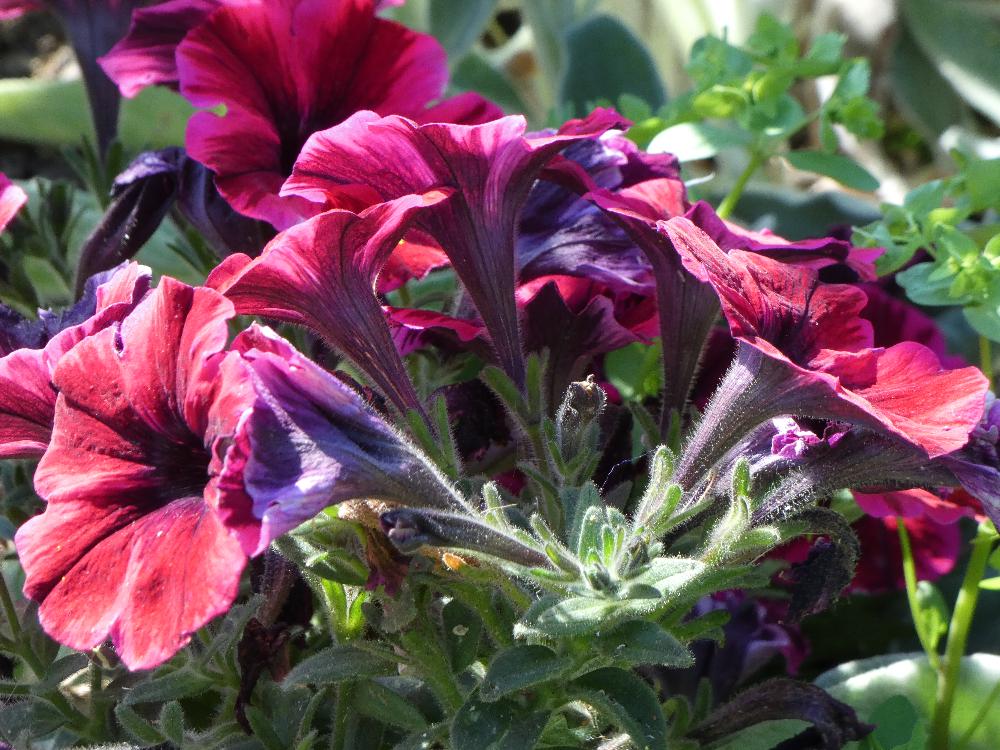
A spirit of collaboration has flourished with the plants. From the children on the first spring planting day running riot with handfuls of seeds, to the graft of SSW volunteers like Andrew, Jane and Barry, as well as the rangers, The Camps Coffee Co. who kindly donated our launch day refreshments, and the Rampion community grant won by our ace fundraiser, Jackie Brownlee; all have had a crucial part to play. The grant is commemorated by the eye-catching circular shaped and multicoloured ‘Wind Spinner’ windmill twirling in the breeze. If everything on display suggests the job is done, well you’re in for a surprise. The park benches are soon to be updated, more bulbs set to be planted, a new sound feature installed and areas are to be textured with bark from materials shredded by the rangers in other public gardens.
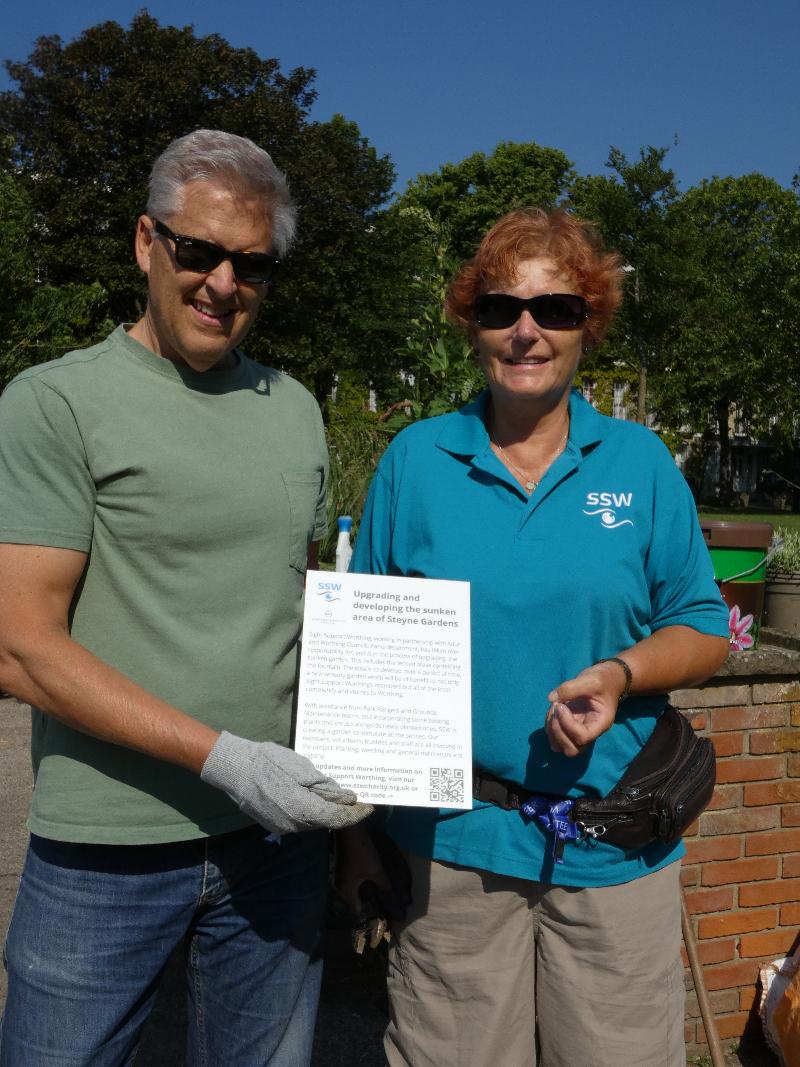
There’s plenty for wildlife too. Six willow, salix and acer trees have been planted in the raised brick outer borders as part of the Queen’s Green Canopy project. Add to that bird feeders for the winter, two wooden insect hotels (dubbed Buggingham Palace and Wingsor Castle), plants to attract butterflies and ‘beebombs’ for bees and you have a truly multidimensional garden. “Green spaces are so important for everyone at the moment,” said the mayor, casting a handful of seeds. ‘’It’s nice to see people working on it.’’ Work that is set to continue apace.
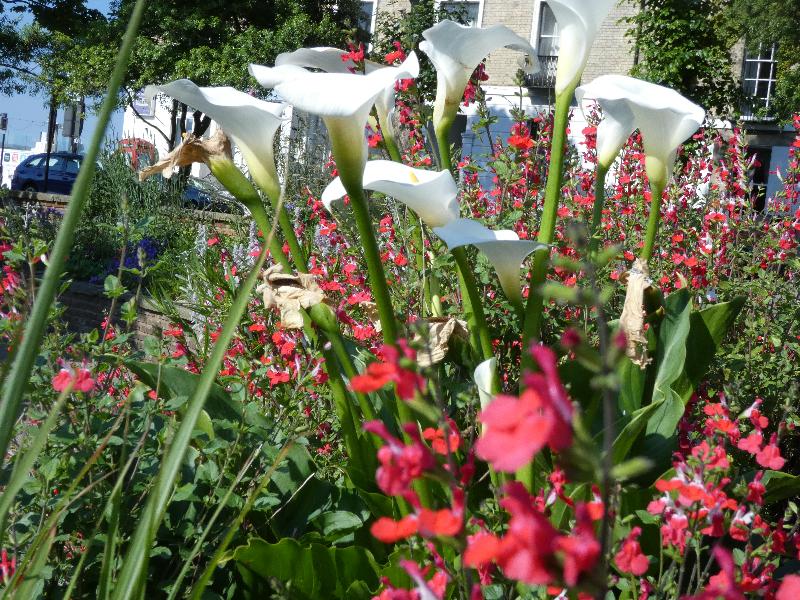
The Sensory Garden is permanently open. If you would like help visiting the garden, please call us on 01903 235782. We’d also love you to get involved with the maintenance of the garden. If you’d like to, please call us on the same number.
Further information
- The Triton fountain
- The Queen’s Green Canopy project
- Rampion offshore wind farm
- An A-Z of the plants in the garden
- Our feature length article in the Worthing Herald

We’re pleased to have launched our wellbeing service including counselling and coaching. For a confidential chat about how we can support you, please get in touch with our dedicated Wellbeing Services Coordinator Kate.
You can email Kate – wellbeing@sightsupportworthing.org.uk or telephone her on 01903 385025.
by Ali Bates, SSW Tech Advisor
It’s Mental Health Awareness week and the theme this year is loneliness. Loneliness is something that one in four of us suffer with at some point in our life. Today I will share my own experience of dealing with loneliness after sight loss.
Six years ago I suffered a detached retina. It was completely unexpected. I woke up one day with slightly blurry vision in my right eye and didn’t really pay it any attention as my eyes would occasionally go blurry and correct themselves later in the day. On this occasion it did not fix itself and I ignored it. I happened to have a routine optician appointment booked in and it was during this that I got told my retina had detached and I should visit the eye clinic. Me being me, I left it a few days… I worked at the hospital at the time so I just called the eye clinic on my next shift. They demanded I came in to them immediately.
I had not expected that what was going on with my eye was an emergency that required urgent surgery. Unfortunately for me, the surgery was not a success. I woke up from the anaesthetic in complete darkness and excruciating pain. Nobody told me but I knew immediately that it had not been a success. The reality of sight loss had not previously occurred to me,
As part of my recovery I had to learn to sleep on my front and lay facedown for 80% of the day in order to give any chance to have some useable sight.
I existed like this for six weeks, in darkness and constant pain. My husband became my carer; he fed, bathed, did hourly eye drops and did everything in the house including looking after both of our children as well as me. For both of us it was incredibly lonely. I was bored, I wanted to read the news, see a friend and just feel normal and not like I was a burden on my husband.
One Saturday, a few weeks in, everything came to a head. I had only left the house for hospital appointments. My husband was physically and mentally exhausted from doing everything and dealing with the shock and uncertainty of my sight loss and inability to do anything. It was like the mental load had physically paralyzed him. We knew we needed some help from outside our four walls but this was not something either of us had ever sought before.
Monday morning my husband called the GP. He asked for help, he broke down, he felt like he had somehow failed as a husband. But, as I type this, I am literally sat here with tears in my eyes because I am so proud of him for recognising he needed some help. It was not failure; it was acceptance that he is human and there is only so much we can deal with on our own. During our entire relationship, every hurdle we have faced we have got through together, but he was so busy being everything to everyone else that he had nothing left for himself. Something had to give.
He had counselling; he was able to talk openly with someone that could help him adjust to our new normal, give him coping strategies and help him feel less alone. He felt able to tell me how he was feeling without feeling guilty, as the reality is that we both lost a lot more than an eye. It changed who we are and the dynamic of our relationship. It was a long recovery but as I adjusted to living without my right eye I was able to be his supportive and fun wife again.
My own mental health recovery took a lot longer. I was so determined to get back to normal and back to work, that I did not stop still and give myself time to make adjustments; I threw myself into everything. I was in denial and angry at the same time. Everyone around me was so busy telling me that I am so brave and what an inspiration I am, which only confused me further as some days my only achievement was getting out of the house to get the kids to school. I would then go home and sit in my house alone, hiding from the real world so no one could see how not ok I was. The short periods of time I was with others I could put my mask on and pretend all was ok.
It was actually our mortgage falling through nearly three years later that finally broke me, us buying our first home had been a focus for so long and at the last moment it was taken away from us. This rekindled my feelings of life being unfair and I went into a tailspin. All my focus went on finding us somewhere new to live and, thankfully, it only took 11 days to find somewhere and get moved in. But then I had a full breakdown. I could not hide from my feelings anymore. I didn’t want to take pills to numb the pain; I NEEDED to deal with everything so now it was my turn to reach out and ask a professional for help. I was lucky to be given a counsellor very quickly.
This lady changed my life. I worked through so much of the trauma I had been living with, accepted that I can still be me even with sight loss and, most importantly, I started to talk openly and honestly. It was not an overnight fix; it has been a long road of acceptance. I still have days of negative feelings but they do not control how I live my life or fill me with feelings of inadequacy. I definitely have many more positive interactions. I will always have a small amount of denial that I am blind but I know that is my stubbornness and determination to live my life on my terms.
I am sharing this as I know being open and honest with my experience may make others feel that they can ask for help. Here at Sight Support Worthing we are passionate about offering our members and their families the support they need. One of our future plans is to offer specialist talking therapy for those living with sight loss as well as their immediate family.
We are putting in a bid to the National Lottery to help fund this vital service. As part of the process we would like feedback from our community. Those of you on our mailing list (email and post) will have had a copy of the survey already. For those of you who have yet to complete it, you can find it here. It should take 3-5 minutes of your time and your feedback will be extremely valued. Thank you.
SSW has been awarded £600 from the Adur and Worthing Trust, as part of Creative Commissions 2022, for its Platinum Jubilee Community Art Project.
The aim of the project is to, as we emerge from the effects of the pandemic, find new ways to engage and connect with both our members and our local community. This project will achieve this objective by collaborating with local talented artists to produce art that will be on show to the public, enhance our neighbourhood, and also foster a good community spirit by celebrating the Queen’s Platinum Jubilee together.
The project includes a series of workshops and events using a variety of techniques and materials to produce large material banners and wire crowns that will be displayed for the public to see and enhance the local area, ready for the Platinum Jubilee celebrations.
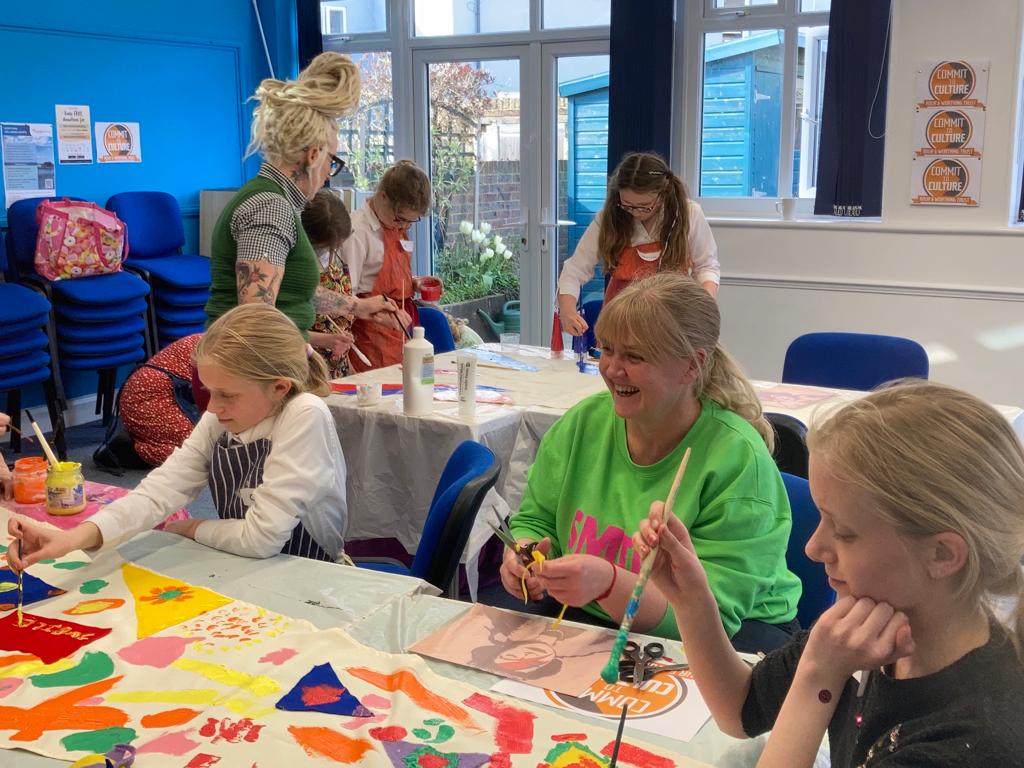
Our plan is to then host an afternoon tea in late May for the artists and everyone else who has participated in the project. This will be an opportunity to celebrate working together as well as the 70 years of her Majesty’s reign.
All events taking place as part of the Platinum Jubilee Community Art Project can be found on our calendar. Contact the Centre (01903 235782 or info@sswcharity.org.uk) to book a place on any of the events.
SSW has several partners in the project including Storm, Art-ful Pottery Cafe and the West End Gallery, all of whom are based near to SSW’s Centre in Rowlands Road. We’re also working with Fiona McVey and Jude Bitton of Inclusive Arts on this project, with Fiona being familiar to SSW members as our art teacher! It is hoped that the project will forge strong relationships between the partners and generate a feeling of community spirit.
The large, decorated banners created will be hung, prior to the Jubilee Bank Holiday weekend in June, on the metal posts positioned on both sides of Rowlands Road for everyone to enjoy. Large wire decorated crowns will also be made, at the organised workshops, and positioned securely on the top of the posts to add an extra dimension to the project.
We hope you can either join us for part of the project, or take a stroll down Rowlands Road later this Spring to admire the creations made by all involved!
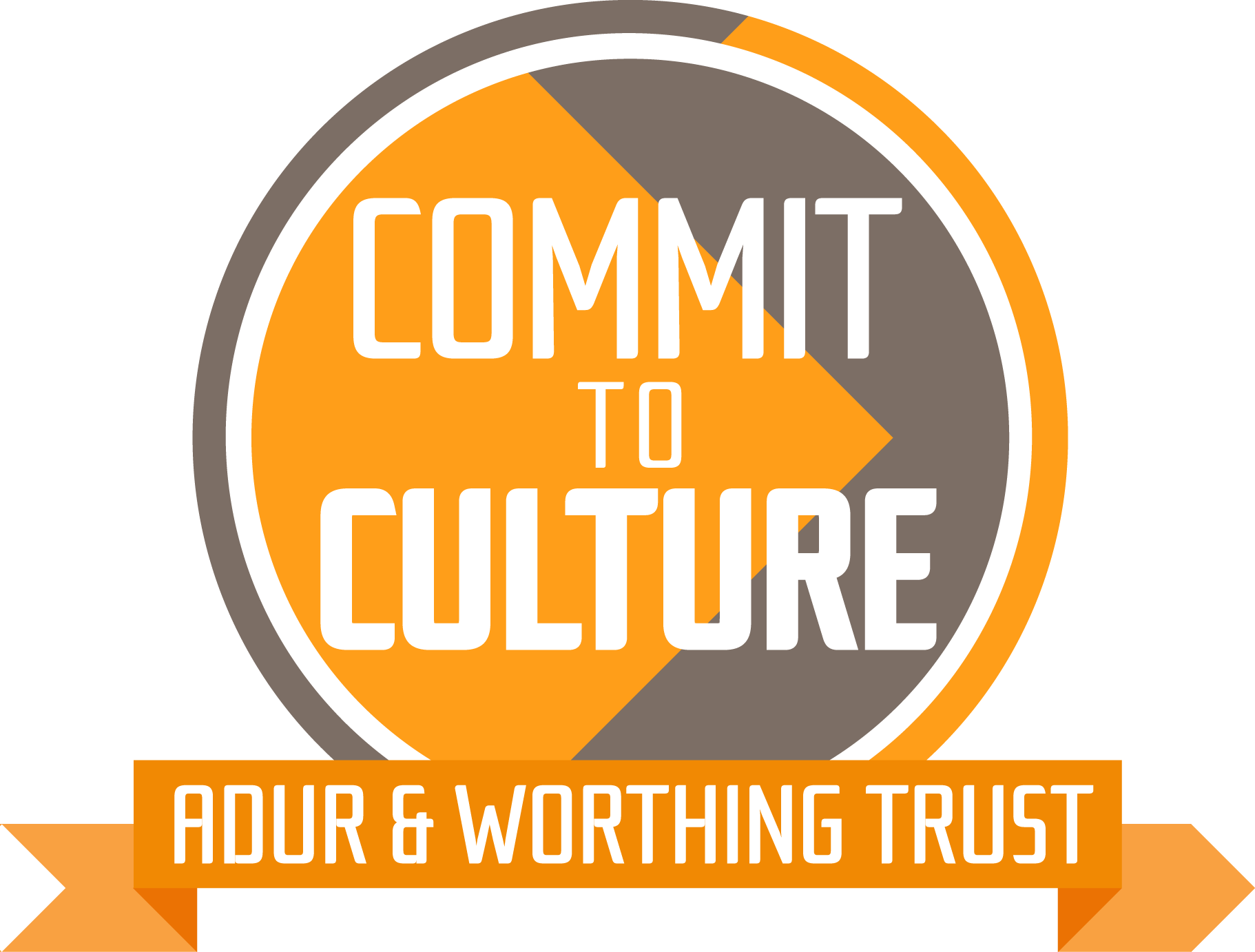
James Langley joined the SSW team in late 2021 as our Events Coordinator and Accessibility Tester. He also works for Blatchington Court Trust as a Leisure Development Officer. Outside of work he has a busy life and enjoys socialising with his buddies, exploring on his mountain bike and honing his Judo skills.
James is visually impaired; he has nystagmus and ocular albinism. Spurred on by SSW team-mate Ali’s recent experiences with her eyes, James has recently asked to be referred to the eye clinic as it has been years since he has had any input from them. He’s aware that there may have been changes in his eyes or he could have even had unknown conditions develop.
Nystagmus presents itself as an involuntary movement of the eyes. In James’s case this is horizontal but it can be vertical, circular or a mixture of these. The condition is due to the signals from the eye to the brain being disrupted and, as such, it cannot be corrected by lenses. James finds it hard to see near things like printed text as well as far away things like objects in the distance.
Ocular albinism reduces the colouring of the iris (the coloured part of the eye) and the retina, which is the light-sensitive tissue at the back of the eye. It affects visual acuity (sharpness of vision) and makes James more sensitive to light. It takes a little longer for his eyes to adjust when he goes from a light room to a dark room and vice versa.
We’ll check back with James when he’s been to see the eye clinic for an update.
Perhaps you’d like to share a little bit about you and your eye health? We’d love to feature you on the website too! Get in touch with Emily – emily@sswcharity.org.uk
by Chris Green, Tech Advisor
There are so many different types of technology out there, it can be hard to keep up. In this series of blog posts, I’m going to take a look at some of the latest accessibility tech to see if it’s worth it. Whether you’re a tech expert or just starting to think about the possibilities, we’re sure you’ll find something new here.
In this post, we will discuss the merits of introducing a smart speaker such as an Amazon Alexa or Google Home into the house, and the associated costs of entry.
So, what is smart tech?
This is a diverse subject with many offshoots, but the general definition is as follows:
It is a technology that uses artificial intelligence, machine learning, and big data analysis to provide cognitive awareness to objects that were in the past considered inanimate.
In this series of blog posts, we will be focusing on ‘Smart Devices’. The definition of a smart device is as follows:
A smart device is an electronic device, generally connected to other devices or networks via different wireless protocols such as WiFi. They can operate to some extent interactively and autonomously.
Some examples of smart devices you may already be familiar with:
- Amazon Alexa
- Google Home
- Smart Phones (Android or Apple)
What is a Smart Speaker?
If you’ve ever heard someone saying ‘Alexa’… ‘Hey Google’… or ‘Siri’ then they are most likely initiating contact with a smart speaker. A smart speaker is a speaker with a built-in microphone that allows users to interact with other smart devices or internet services using their voice.
Saying these keywords (‘Alexa’… ‘Hey Google’… or ‘Siri’) is a way of opening a line to the internet, the same as picking up the phone is opening a line ready to dial a number. It is the job of a smart speaker to translate your spoken word into text which is then sent via the internet as a question or command.

What will it do for me?
The examples below can be performed by using voice commands anywhere in the room:
- Listen to your favourite radio station, audiobook or play your favourite song
- Set alarms, timers, reminders, calendar entries and create/recall lists
- Listen to the news and weather
- Recipes, conversion tools and calculations
- Make free calls
- Control other smart connected devices such as lighting, TV, heating thermostats and power points
What will I need to get going?
- An internet connection at your home address
- An email address
- A smart phone or tablet for initial setup **
- A smart speaker
**it’s possible that a friend could complete the initial setup for you
How much will it cost?
If you have no internet, smart phone or tablet then the initial setup cost will vary depending on the devices you choose. The prices below are based on what I feel would provide adequate performance for value.
One off cost
Email account – FREE
Smart phone or tablet – £80
Smart speaker – £30
Ongoing costs
Average cost for a basic internet connection – £19 pcm
Is it worth it?
Personally, as someone who has been using smart devices for a number of years, I have grown accustomed to the convenience of having an encyclopaedia of information to hand for those moments when the grey matter isn’t up to the job.
I also like that my smart speaker doubles up as a radio alarm clock, controls my lighting, I can set my house alarm remotely or control my heating if I’m away.
Do I ‘need’ a smart speaker in my life? Probably not, but it sure does help.
If you’d like more advice or help setting up tech in your home, please do get in touch with me, or my colleague Ali, and we can discuss the possibilities available to you.
by Alison Bates, SSW Tech Advisor
Ok, so I will start off by saying I didn’t actually notice I am blind. Earlier this week I had an appointment with the eye clinic and during the visit a doctor suggested I be registered as sight impaired. I was pleased as I have been asking about this for the last few years but got fobbed off and didn’t pursue it.
Today I had a sight care advisor call me to ask some questions, so that she could get the paperwork sorted to get me registered as severe sight impaired. I had to ask her to repeat herself as I thought I was being registered simply as sight impaired. She apologised as she had been told I had consented to being registered, which I had: I just had just assumed it was for sight impairment.
Sight impaired means partially sighted, and severe sight impaired means blind. But I can see – sort of – out of one eye that randomly goes blurry. But I CAN SEE! It’s just hard work. ‘Blind’ doesn’t mean no vision – I know that – I just never really considered that my sight was that bad.
Then I remember I can’t read books anymore, not the paper ones anyway. I can’t make eye contact with people because I can’t see their eyes; I can’t even see my own eye colour in the mirror. So this, and so much more that I don’t even take into consideration, means that legally I am blind.
This changes nothing about me or my sight except a bit more self-awareness. Maybe I will be more patient with myself and allow more time to process things, ask for help and – even better – still accept help when its offered rather than just trying to stubbornly get on with it (yeah, right).
Alison Bates, official BLINDO
As winter is almost here, and with it the cold weather and icy pavements, it may be tricky to get out and about as much as usual. If this is the case – either for you or someone you know – do feel free to book a regular chat over the phone with one of our volunteer team. Call now on 01903 235782 or drop us an email
